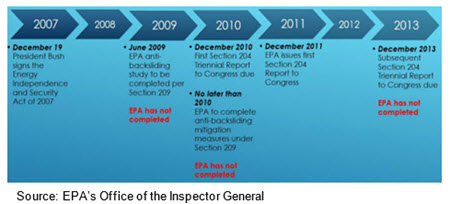WASHINGTON, Sept. 8, 2016 - The EPA’s Inspector General is faulting the agency for failing to provide timely reports to Congress on the impacts of biofuels.
The Office of Inspector General (IG) conducted an evaluation to determine if EPA has complied with the Renewable Fuel Standard (RFS) statutory reporting requirement. It also reviewed whether EPA had updated the lifecycle analysis supporting the RFS with findings from the statutorily mandated National Academy of Sciences 2011 study on biofuels, EPA’s 2011 Report to Congress on the Environmental Impacts of Biofuels and any subsequent reports or relevant research on biofuels.
The IG says that the RFS reporting requirement provides for an objective analysis on the environmental impacts and unintended consequences of the U.S. biofuel policy.
 This analysis is important, the IG said, because of
conflicting scientific opinions about biofuel impacts, potential impacts
outside of EPA’s regulatory control and divergent RFS interests.
This analysis is important, the IG said, because of
conflicting scientific opinions about biofuel impacts, potential impacts
outside of EPA’s regulatory control and divergent RFS interests.
The IG’s evaluation found that EPA’s Office of Research and Development has not complied with the requirement to provide a report every three years to Congress on the impacts of biofuels.
The evaluation also concluded that EPA does not have an assessment that meets the requirement to identify whether the RFS creates any impacts on air quality, which would allow EPA to take required measures to mitigate impacts. This information is needed to fully inform EPA, Congress and other stakeholders of the environmental impacts of U.S. biofuel policy, the IG said.
In addition, the report said that EPA’s Office of Air and Radiation has not fulfilled the anti-backsliding requirements for the RFS, which would analyze and address any negative air quality impacts of RFS.
The Inspector General’s office recommended that EPA’s assistant administrator for research and development provide Congress with triennial reports on the impacts of biofuels as required and also recommended that the assistant administrator for air and radiation complete the anti-backsliding study as required and determine if additional mitigation is needed.
The IG also recommended that, although not required by statute, EPA develop or identify the process for evaluating the lifecycle science and determining whether to update the greenhouse gas threshold determinations.
EPA agreed with all recommendations and provided planned completion dates, the IG said.
To read IG’s full evaluation and recommendations, click here.
#30
For more news, go to: www.Agri-Pulse.com
